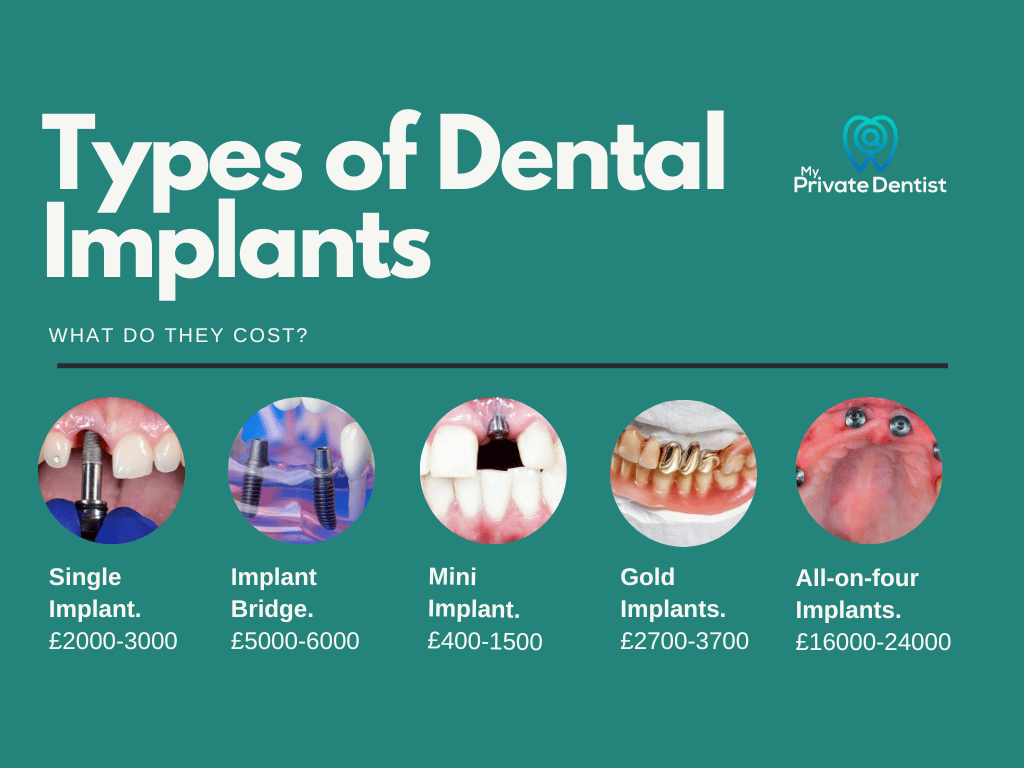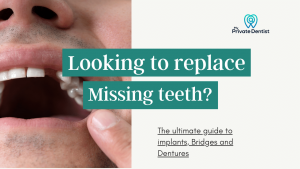A dental implant is a popular and reliable option for replacing a missing tooth, but they can be expensive. On average, a tooth implant cost UK is £2,000-£3,000. There are many factors affecting the price including complexity, dentist expertise, implant system used, and number of implants required. As treatment is case specific, it is important to have a dental consultation to determine suitability and price.
Dental implants are a long term solution for missing teeth that involves ‘implanting’ a titanium screw into the jawbone. Over time, the screw fuses with the bone, providing a stable foundation for a crown. Although an excellent treatment option, with predictability and high success rates, they are also a costly investment. It is essential to consider the expense before making a decision.
In this article, I aim to discuss tooth implant cost UK, and the individual factors that can affect cost. Read on to find out if implants are worth it for you, and what you should consider before you make a decision.
Table of Contents
Different types of tooth implant cost UK

- Single implant: This treatment involves replacing a single missing tooth with a dental implant and typically costs between £2,000-£3,000. To ensure the success of the implant, a thorough examination of the patient’s dental and medical history is performed, and the implant is placed using the latest minimally invasive surgical techniques.
- Implants for multiple missing teeth: When several teeth are missing, a fixed bridge can be anchored to two or more dental implants to replace the missing teeth. The cost for this treatment typically ranges from £5,000-£6,000, and the bridge is custom-designed to fit seamlessly in the patient’s mouth.
- Mini implant: For patients with insufficient jawbone density, mini implants can provide a more affordable alternative to traditional implants. These smaller implants are placed using a minimally invasive procedure and typically cost between £400-£1,500.
- Gold tooth implants: Some patients may opt for gold alloy crowns on their dental implants. Gold is a strong material that is less prone to chipping than porcelain, although the treatment can be more expensive due to the cost of the gold. The cost for this treatment typically ranges from £2,700-£3,700.
- All on 4 dental implants: For patients who are missing all teeth in an arch, the all-on-4 treatment involves placing six implants in the upper jaw and four implants in the lower jaw to support a fixed denture. The cost for one arch of teeth typically ranges from £16,000-£24,000, but the result is a natural-looking and functional set of teeth that can last a lifetime.
Are dental implants available on the NHS?
Dental implants are not routinely available on the NHS, and are often considered a private treatment option to improve aesthetics.
However there are some exceptions to this. If you have lost teeth following a serious accident, or due to mouth cancer, you may be able to have treatment on the NHS as part of reconstructive surgery.
NHS provision for a dental implant will be in a hospital setting, under a team of consultants.
Why is tooth implant cost UK so high?
The high cost of dental implants can be off-putting for some, especially when there are cheaper alternatives available, such as dentures or bridges. So why is it so expensive?
Implants are an investment in restoring both function and your smile, and there are many factors that contribute to the overall cost:
- Materials used. The components of a dental implant need to be extremely sturdy and strong for longevity, and so expensive high-quality materials such as titanium screws are needed. Once the implant is placed, a crown, bridge, or denture is then fixed on top of it. Zirconia crowns are strong and biocompatible, but they may also add to the overall cost of treatment.
- Different brands of implants. These can also vary in cost, and certain dentists may have more confidence in using certain products, which can affect the final price.
- Dentist’s experience. Dentists who place implants need to have enhanced training and special skills, often with expensive mentors, and patients are paying for the expertise of the dentist.
- Additional treatment need. If a patient doesn’t have enough natural bone to support an implant, a bone graft or sinus lift may be necessary first. These produces require complex surgery and clinician’s time.
- Number of implants: More implants mean more materials and time needed.
Are dental implants worth the cost?
Dental implants can be a worthwhile investment despite their cost because of the many benefits they offer. Unlike dentures, they provide a fixed, permanent option for replacing missing teeth, which can improve your chewing ability, speech, and overall confidence.
Implants are also more comfortable and less bulky than other options, and so can be a good option for patients that have struggled with dentures or bridges in the past.
A single implant can replace a single missing tooth without relying on adjacent teeth for support. Unlike bridges, implants don’t require any preparation to teeth on either side. And unlike dentures, implants don’t use adjacent teeth to keep them in place, which can reduce the risk of sensitivity or decay in neighbouring teeth.
Another advantage of implants is that with proper care and maintenance, they can be long lasting. Studies have shown a success rate of over 97% after 10 years [1]. As the titanium screw fuses, or integrates, with the jaw bone after placement, they are very strong and are able to function like a natural tooth. They implants also help to maintain bone level in the jaw after tooth extraction.
Implant crowns can be made highly aesthetic, and customised to match the shade and contour of your natural teeth. If you haven’t had success with dentures or bridges in the past and want a more permanent solution, dental implants may be the right choice for you.
I can’t afford dental implants, what should I do?
If you can’t afford dental implants, there are still several options available to you.
Firstly, check if the dental practice offers financing options or payment plans that can make the cost more manageable.
You can also consider other replacement options, such as bridges or dentures, to maintain the space until you can save up for an implant. Although these alternatives may not offer the same long-term benefits as dental implants, they can still provide a functional and aesthetic solution for missing teeth.
What is a dental implant procedure?
To fully understand the tooth implant cost in UK, it is important to understand the dental implant procedure. Here are the key steps:
- Consultation: Your dentist will assess your dental health, evaluate your concerns about missing teeth, and discuss treatment options with you.
- Special tests: Before implant placement, special X-rays and CBCT scans must be taken to assess bone density and the anatomical position of structures.
- Surgical phase: The implant is placed surgically into the jawbone. This procedure can take 2-3 hours, and local anaesthesia is used to ensure it is pain-free.
- Healing period: After implant placement, there is a healing period of several months to allow the implant to fuse with the jawbone.
- Restorative phase: Once the implant has successfully integrated with the bone, the prosthesis (crown, bridge, or denture) can be placed on top. This is the visible part of the dental implant.
Are dental implants painful?
The placement of dental implants is performed under local anaesthesia, which means the procedure itself should be painless. Some dental practices may also offer sedation options to help patients who are particularly nervous or anxious about the treatment.
After the surgery, it is normal to experience some discomfort or tenderness for 1-2 weeks as the area heals. Swelling may also occur, but can typically be managed with the pain medication that is recommended by your dentist.
Am I suitable for dental implants?
Dental implants may not be suitable for everyone. Some factors that would rule out someone from getting implants include:
- Smokers: Smoking increases the risk of gum disease and bone loss, which can make implant placement more likely to fail
- Uncontrolled periodontal disease: Implants require healthy gums and bone to be successful. If you have periodontal disease that is not under control, you may not be a good candidate for implants.
- Poor oral hygiene: Good oral hygiene is crucial for implant success. If you don’t take good care of your teeth and gums, you may not be a good candidate for implants. You could also be at risk of peri-implantitis.
- Being unable to tolerate long procedures: Implant treatment requires multiple appointments and can take several months from start to finish.
- Certain medical conditions: Patients with conditions such as uncontrolled diabetes, osteoporosis, bleeding or immune disorders are not suitable for implants [2].
- Grinders, or bruxists: Habits such as teeth grinding or clenching can put excess pressure on implants and may cause them to fail.
- Children: Children and adolescents whose jawbones have not fully developed are generally not suitable candidates for dental implants. It is recommended to wait until the jawbone has finished growing before considering implant placement.
What should I do now?
Discuss your options for replacing a missing tooth, find a dentist to help you determine the best course of action for your individual needs and budget.



